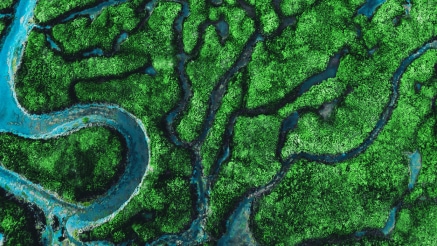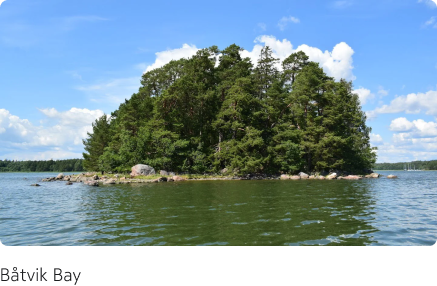Biodiversity

Biodiversity can be defined as the variety of animals, plants, fungi, and even micro-organisms such as bacteria that make up our natural world in a particular area. Biodiversity can be considered material for every company and individual as it provides everything in nature that we need to survive food, clean water, medicine, and even shelter.
Although biodiversity is of increasing importance for our stakeholders, at Nokia we also look more broadly at our dependence on natural resources, including climate, biodiversity, and geological diversity (geodiversity). By geodiversity, we mean the earth's minerals, rocks, fossils, soils, sediments, landforms, topography and hydrological features such as rivers and lakes.
While the ICT industry is not considered to be one of the high-impacting sectors related to biodiversity, the story may be different for geodiversity. From a geodiversity perspective, the production of ICT hardware requires various metals, minerals, plastics, chemicals, energy and water in a multi-tier supply chain.
Beyond our science-based climate targets, we have now started to work to understand the impacts affecting natural capital (including biodiversity and geodiversity) across our value chain. These areas include mining raw materials and component production, final assembly production, logistics and fleet, installation and use, maintenance of sold products, and product end-of-life activities. To find out more, read Nokia's position paper on biodiversity and geodiversity.

Biodiversity in action 2023
University cooperation
We announced a new co-funded tenure-track professorship at the University of Jyväskylä to improve biodiversity footprint assessments in companies. This activity is an important step on a broader longstanding commitment to combating climate change and minimizing environmental impacts.
Nokia, University of Jyväskylä and Sitra collaborate to improve biodiversity footprint assessments
UN Global Compact SBTN working group
We are part of the UN Global Compact Finland SBTN working group. Together with Ramboll Finland, the UN Global Compact developed the Science Based Targets for Nature (SBTN) program. This training involves 15 Finnish companies from different areas. It is the first program of its kind by UN Global Compact. It started in 2023 and finishes spring 2024.
Nature protection
Nokia has a number of nature conservation areas on both land and sea. In 2023, our total protected area expanded to 242 hectares, comprising 131 hectares of forested areas, 11 islands, and 111 hectares of marine environments. This include areas in Siuntio and Båtvik in the south of Finland as well as Rikkisaari and parts of the Kitka river in the north of Finland. These areas contain a mix of different plants and animals contributing to a rich biodiverse habitat.
In 2023 Nokia established two new conservation areas. The major addition to our protected sites is Kitkajoki-Arvunki, covering approximately 71 ha in Kuusamo. The smaller 14 ha area has been protected in Siuntio, Southern Finland.
The Kitkajoki-Arvunki conservation area is more substantial in size than it might appear, as it combines our previously established Harjasuo-Laurinkorpi conservation area. The combined area is now 103 ha. The newly established conservation area boasts approximately 1.5 km of Kitkajoki riverbank, which is aesthetically valuable ridge forest in this area. In the middle of the conservation area lies Lake Arvunki, and a couple of pristine streams flow through the area. The forests in the area have been excluded from economic use for decades.
The Siuntio area is a mosaic of rocky and heath forests, enriched by cliffs and small groves providing an authentic representation of southern Finland's diverse and captivating natural landscape.
The oceans and seas are also linked to Nokia’s business. Nokia’s Alcatel Submarine Networks (ASN) develops and installs the subsea optical fiber networks that connect the world. ASN’s aim is to do this in a responsible and sustainable way.
Ocean Decade Corporate Data Group
In November 2022 ASN was the first private company to join the Ocean Decade Corporate Data Group. This initiative, led by the Intergovernmental Oceanographic Commission (IOC) of UNESCO, is aiming accelerate our understanding of the ocean, its biodiversity and its geophysics parameters to help in its preservation. The IOC promotes international cooperation in marine sciences to improve management of the ocean, coasts and marine resources.
The Ocean Cleanup
In early 2023 we announced that we will deploy private wireless connectivity, network edge equipment and analytics for The Ocean Cleanup, the international non-profit project working to develop and scale technologies to rid the world’s oceans of plastic.
5G, private wireless, edge compute, sensors, AI-based analytics, drones and other advanced technologies will play an increasingly critical role in supporting the conservation and sustainability of our natural environment by providing immediate up-to-date and constant information on the status of the environment, whether on land or in the sea. Working with The Ocean Cleanup provides the opportunity to explore that role further.
John Nurminen Foundation
In late 2022, we confirmed an exciting partnership with the John Nurminen Foundation to protect biodiversity in the Baltic Sea. A three-year joint effort is meant to combat eutrophication in the Baltic Sea and the associated risk to biodiversity. Nokia’s critical role is to support the conservation and sustainability of natural habitats by providing immediate up-to-date and constant information on the status of the environment whether on land or in the sea through our advanced technologies.
